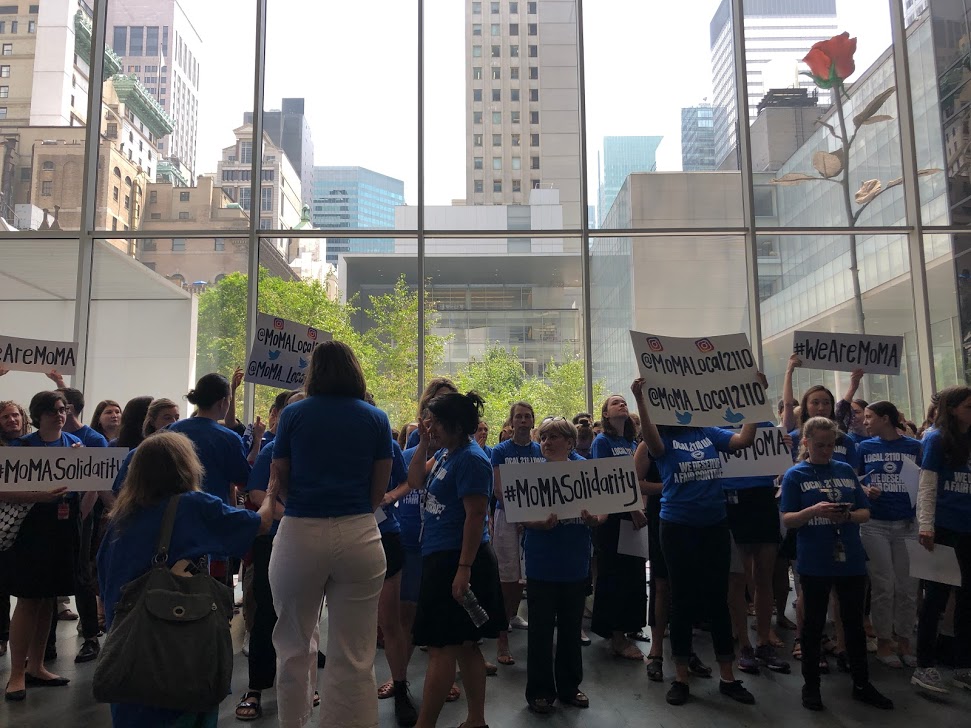[ad_1]
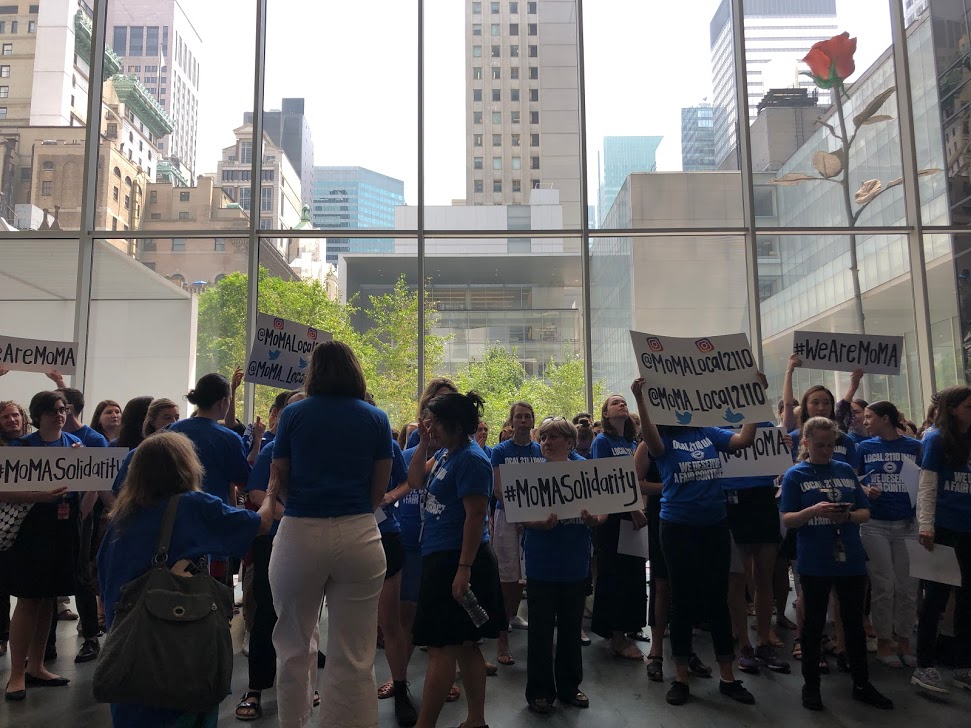
UAW Local 2110 members demonstrating in the lobby of the Museum of Modern Art in New York today.
ANDREW RUSSETH/ARTNEWS
By about a quarter past noon today, scores of employees at the Museum of Modern Art in New York had gathered in the institution’s lobby, in front of its famed sculpture garden, where Isa Genzken’s Rose II (2007) stretched high into the air. Most were wearing blue shirts with white letters reading, “LOCAL 2110 UAW/WE DESERVE A FAIR CONTRACT,” and some held signs with messages like “#WeAreMoMA” and “#MoMA Solidarity.”
As a large crowd of visitors waited in line to buy tickets, Maida Rosenstein, the president of United Auto Workers Local 2110, introduced the demonstrators, shouting, “We are the unionized workers of MoMA! We are curators, librarians, visitor services, stewards, accounting, and we are in contract negotiations. We thank you for your support and we have a museum. Solidarity forever is our message.”
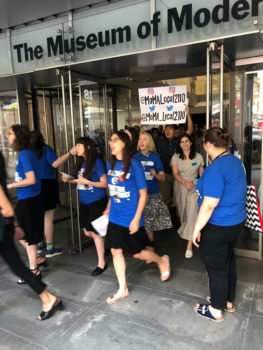
Union members exiting onto West 54th Street and heading east.
ANDREW RUSSETH/ARTNEWS
And with that, the union demonstrators, now numbering somewhere in the ballpark of 100, burst into the Industrial Workers of the World standard “Solidarity Forever,” a Pete Seeger staple, which begins: “Solidarity forever / solidarity forever / solidarity forever / Because the union makes us strong.” People in line and on the balconies that line the museum’s atrium snapped photos; some applauded at the end.
The union, which represents some 260 members, has been without a new contract since May 20, and its leadership has said that it has numerous points of disagreement with MoMA, among them health care costs, job security for junior employees, and mandatory salary increases tied to time of service, which the union has said the museum wants to reduce or eliminate.
MoMA did not immediately reply to a request for comment on today’s action, but following a demonstration on May 31 outside its annual gala it released a statement that said, in part, “MoMA’s extraordinary staff are the best in the world. We are committed to working with the Local 2110 to reach an agreement that will keep our community of dedicated staff and the museum on a path of financial stability and future growth.”
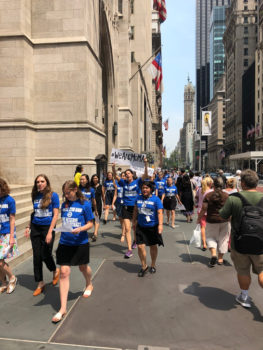
The demonstration on Fifth Avenue, heading south.
ANDREW RUSSETH/ARTNEWS
Chants were also delivered in the lobby: “Ancient wages! Modern art!” and “What do we want? A contract! When do we want it? Now!” Afterward, the union members marched out onto West 54th Street, chanting as they began their way around the block, moving along the garden, turning onto Fifth Avenue, passing a Gap store, turning again on West 53rd, cruising by Saint Thomas Church, and ending at the entrance on 53rd Street that is being used while the museum undergoes a $400 million expansion scheduled to open next year. The union has made that big-budget construction project a key part of its public argument for an improved contract for workers.
After cheers, Rosenstein addressed the union members, who stood in columns along the sidewalk so that people could pass. “This action is all about showing our solidarity and unity as union membership,” she said, and added that “we’re going to do it again and again and again until they make a fair contract offer.”
The action, which lasted about 30 minutes in total, ended with a final chant: “Let’s remind Glenn Lowry and everyone at the museum!” one of the organizers shouted. “We are MoMA! We are MoMA!” The members joined in as they moved back into the museum, back to work.
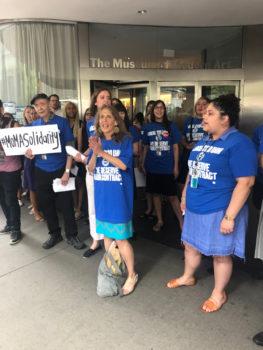
Rosenstein, the president of Local 2110, speaking at the museum’s entrance on West 53rd.
ANDREW RUSSETH/ARTNEWS
As the crowd dissipated, Rosenstein explained why they decided to stage the demonstration. The next planned negotiation is tomorrow, she said, “and we want the museum to know how strongly the membership feels about the issues that we have on the table. Very simple, you know?”
Asked whether the union would consider a strike, she said, “It’s obviously something that is out there,” and noted that such a move would require a vote of the union’s members. “We’ll play that out as it occurs,” she said. “Obviously we would prefer to have a peaceful resolution to these negotiations, no question. But we have been on strike before, and if we had to do it again, we would mobilize for that.” The last time the union went on strike was in 2000, an action that lasted for more than four months.
In her speech to the union members, Rosenstein said of the union’s negotiating committee, “We feel very empowered because we know that you are behind us. You are standing alongside us. You are with us, even if you are not in the room.” However, she noted that some members had been afraid to come out, because they are new employees or have never been in a union.
“If you have colleagues who were afraid to come out, afraid to support you, talk to them,” she said. “Tell them it was fun. Tell them we were all together. Tell them that together we can win a fair contract. Encourage and bring them along with us so next time we’re going to be even bigger.”
[ad_2]
Source link

